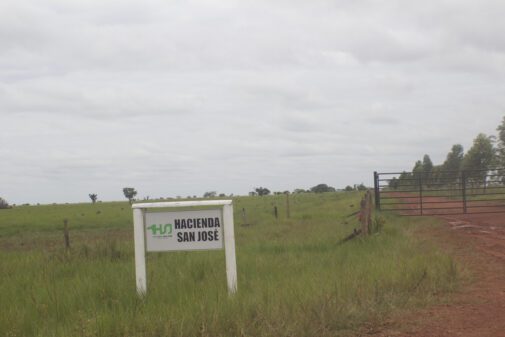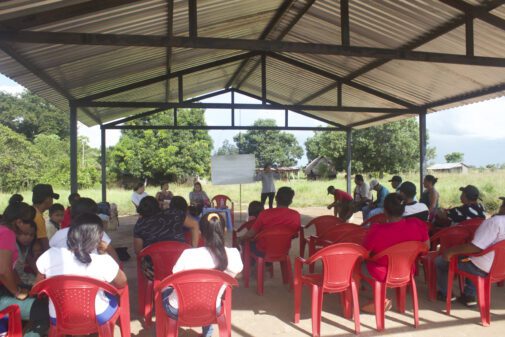Press Release: Human Rights and Environmental Concerns Found in UN-financed large-scale Livestock Project in Colombia
Human Rights and Environmental Concerns Found in UN-financed large-scale Livestock Project in Colombia
Green Climate Fund, Public Banks, and other Climate Financiers must Divest from False Climate Solutions
[BOGOTA, 5 March 2024] — The United Nations-backed Green Climate Fund through &Green and the FMO (The Dutch Development Bank) and other climate financiers must halt financing false solutions to climate change and redirect support to community-based and more effective solutions to the climate crisis, the Global Forest Coalition (GFC), Movimiento Social Tejido Unuma de la Orinoquia, and Corporación Claretiana Norman Perez Bello (CCNPB) said today.
In a new report released today, GFC, Tejido Unuma de la Orinoquía, and CCNPB shed light on the pitfalls of large-scale livestock initiatives, calling for a reevaluation of climate finance allocation. The report, titled “Examining Sustainable Livestock Intensification and Financing: A Critical Analysis of the Hacienda San José Case in Colombia,” identifies and analyses the dangers of large-scale livestock initiatives and calls for a re-evaluation of the allocation of climate finance.
The reality does not align with the project’s purported sustainable goals.

One of the entrances to the Hacienda San José facilities, near the airstrip.
The Hacienda, a beef production farm in the Vichada department, has positioned itself as an exemplar of sustainable livestock farming, emphasizing genetic improvement and environmentally friendly practices. However, initial findings from field research on Hacienda San José, whose expansion is funded by the Dutch &Green Fund, the FMO and the UN’s Green Climate Fund, highlight significant risks associated with large-scale livestock projects.
“The reality does not align with the project’s purported sustainable goals,” said Andrea Echeverri, Unsustainable Livestock Campaign Coordinator for GFC, which is also a steering committee member of the Stop Financing Factory Farming coalition. “There is no room for large-scale livestock farming in equitable, sustainable, decolonial and gender-just food systems. We need to divest from factory farming and redirect finance flows towards sustainable food systems that encourage local and culturally appropriate food chains.”
The Hacienda has been receiving funds through the Dutch &Green Fund since 2021, and in 2023, the UN’s Green Climate Fund granted approval of further funding during its July 2023 board meeting in Incheon, Korea, under the 980-million-USD FP212 Project.
In Colombia, the project included in the portfolio is the expansion of the Hacienda San José, justified under the concept of Sustainable Livestock Intensification. Hacienda San José aims to reach 400,000 hectares by 2050, and the initial expansion of 180,000 hectares financed by &Green is considered a starting point. This expansion will be facilitated through a loan of 30 billion Colombian pesos (USD 7.5 million).
The report identifies key concerns within the Hacienda San José plan around its land expansion and Indigenous rights, with plans to expand the Hacienda conflicting with the Sikuani Reservation Campo Alegre y Ripialito expansion plans and post-conflict land restitution efforts. Importantly, field research uncovered that Indigenous Sikuani people do not feel they were adequately informed or consulted, violating the principle of Free, Prior, and Informed Consent.
Hacienda San José is an attempt at expansion and land grabbing, far from the rights of Indigenous and peasant peoples.
Issues were also raised regarding Hacienda’s corporate social responsibility commitments, with its support for education failing quality standards and relevance to the local context and limited access to essential resources for students. Claims of investments in the local health centre could not be verified during field visits.
The report also highlights issues around labour conditions, with workers raising concerns about harsh working conditions, including using internationally banned insecticides without proper protection. Projected employment numbers have also not been met, raising questions about the Hacienda’s commitment to its workforce.

A day to share information about the HSJ expansion: In November 2023, for two days, traditional authorities, men, women and children attended a workshop to share and gather information about the project and the HSJ.
Furthermore, there are also concerns regarding the environmental impact of the planned expansion. Operations at Hacienda San José reportedly negatively affect biodiversity and soil quality, leading to a loss of wildlife in the region. The farm’s offsetting activities are likely inadequate to compensate for increased greenhouse gas emissions from cattle.
“Contrary to strengthening the enjoyment of territory for native populations, Hacienda San José is an attempt at expansion and land grabbing, far from the rights of Indigenous and peasant peoples; as plans to exponentially expand Hacienda San José (with climate finance) conflict with the claim of expansion of the Indigenous Resguardo, as well as post-conflict land restitution efforts”, said Jaime León, of the Corporación Claretiana Norman Pérez Bello.
The FP212 project, totalling USD 981.6 million, aims to promote sustainable raw material production and enhance agricultural productivity across 11 countries in Latin America, Africa, and Asia, with the goal of reducing deforestation for agricultural purposes. Despite being classified as a high-risk project (Category A) by the GCF due to its potential significant social and environmental impacts, the GCF emphasizes that accredited entities, such as the Dutch Entrepreneurial Development Bank (FMO), implement their own risk management systems. The FMO, alongside the &Green Fund, serves as the executing entity for Project FP212. The Colombian Designated National Authority, the National Department of Planning, oversees disbursement facilitation for the project.
“This is not a one-off case. This is being replicated across the globe time and again. These projects don’t only pose a threat to local environmental and community rights. Still, they are not helping us stem emissions and the threat of irreversible climate change,” said Gadir Lavadenz, GFC’s Forests and Climate Change Campaign Coordinator. “Climate finance must be redirected away from greenwashing and towards real solutions and a ‘just transition’, supporting frontline communities, conservation, protection of land and forests, and genuine reforestation.”
To combat the climate crisis effectively, climate finance must be directed towards initiatives that genuinely contribute to tackling climate change without causing harm to communities or the environment, GFC and CCNPB said.
According to GCF, the UN-backed fund is the world’s largest climate fund, with a portfolio of USD 13.5 billion (USD 51.9 billion, including co-financing) across investments in more than 120 countries. Established in 2010, the GCF has a mandate from both the U.N. Framework Convention on Climate Change and the Paris Agreement to assist Global South nations in mitigating the effects of climate change. Nonetheless, the GCF has a track record of endorsing and financing contentious initiatives. For instance, it entered into a $25 million equity arrangement with the Arbaro Fund, a private equity investment firm based in Germany. This investment supported monoculture tree plantations, causing significant adverse impacts on the social, environmental, and economic fronts, particularly in the Global South.
“Hacienda San José is a stark example of the gap between sustainable aspirations and on-the-ground realities. It is imperative that financiers divest from such initiatives and redirect funds to projects that truly contribute to climate solutions and that recognise historical responsibility, a common but differentiated response, and the rights and traditional knowledge and wisdom of Indigenous Peoples, women in all their diversities, and local communities,” said Anarley Hoyos from CCNPB.
###
For more information and media inquiries, please contact:
Ismail Wolff (English): ismail.wolff@globalforestcoalition.org
Andrea Echeverri (English/Spanish): andrea.echeverri@globalforestcoalition.org
Corporación Claretiana Norman Pérez Bello (Spanish): email: corpoclaretiananpb@corpoclaretiana.org
Download the Full Report
Executive Summaries, and the complete report in both Spanish and English are available for download on the GFC website here:
Executive Summary: English, Spanish
About GFC
The Global Forest Coalition (GFC) is an international coalition of more than 130 NGOs and Indigenous Peoples’ Organizations across 75 countries, defending social justice and the rights of forest peoples in forest policies. GFC was founded in 2000 by 19 NGOs and Indigenous Peoples’ Organizations (IPOs) from all over the world. It is a successor to the NGO Forest Working Group, which was originally established in 1995.
About CCNPB
The Corporación Claretiana Norman Pérez Bello is a civil society organization that defends human rights and international humanitarian law, which advises and accompanies victims of socio-political violence, peasant and indigenous communities in the defense of territorial rights in the departments of Meta, Vichada, Casanare, Boyacá and Cundinamarca in Colombia.
About Tejido Unuma
Tejido Unuma de la Orinoquía is a political-organizational movement that brings together more than 20 communities, indigenous peoples and peasants from Meta, Vichada and Casanare departments in Colombia. This collective has been carrying out actions aimed at harmonizing the territory, ensuring land tenure and protection, caring for nature, revitalizing cultural and ancestral traditions, defending human rights, and building peace in the regions of the Orinoco.











